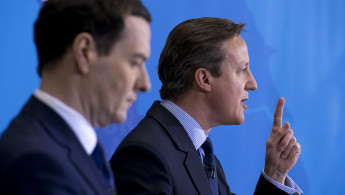Britain strikes IS fighters in Syria for first time
British Prime Minister David Cameron said a Royal Air Force drone strike has killed three Islamic State fighters in Syria including at least one British man who had been planning attacks against the UK.
Cameron told Parliament on Monday that the attack was lawful, saying the attorney general had been consulted and had approved the attack.
"In an act of self-defence Reyaad Khan was killed in a precision airstrike carried out on August 21 by an RAF remotely piloted aircraft while he was travelling in a vehicle in the area of Raqqah in Syria," he told parliament.
The prime minister said the threat from Islamic State fighters was more acute than ever before and that the drone attack was the only "feasible means" of dealing with the danger.
Cameron also said police and security forces had thwarted at least six terror attacks inside Britain in the last 12 months.
It comes following an announcement that Cameron wants to hold a vote in parliament in early October to pave the way for airstrikes against IS in Syria, joining an international coalition led by the United States which has been carrying out such strikes for the past year.
Chancellor George Osborne said that Britain and Europe had to find a way to tackle the conflict in Syria, which has fuelled Europe's biggest refugee crisis since World War Two, and described the government of President Bashar al-Assad as "evil."
"You've got to deal with the problem at source, which is this evil Assad regime and the ISIL [Islamic State] terrorists, and you need a comprehensive plan for a more stable, peaceful Syria," Osborne told Reuters in an interview.
But demands for the resignation of Assad were criticised by Iran's foreign minister on Monday, who said such calls have prolonged the Arab country's civil war.
Mohammad Javad Zarif went so far as to say that those who have in the past years demanded Assad's ouster "are responsible for the bloodshed in Syria."
The top Iranian diplomat did not name any specific country in the region but was likely referring to Turkey's and Saudi Arabia's repeated calls for Assad to step down.
Syria's foreign ministry, meanwhile, condemned British "interference" in its affairs.
Syrian state news agency SANA said the foreign ministry had sent two letters to United Nations chiefs which objected to "brazen standpoints" taken by British officials, and accused Britain and France of a "colonialist" agenda.
France on Monday announced it will send reconnaissance flights over Syria beginning Tuesday to help plan airstrikes in the fight against the Islamic State group.
Policy 'on the hoof'
However, Prime Minister David Cameron's hope that Britain would join airstrikes IS group targets in Syria is fading due to the likely election of anti-war campaigner Jeremy Corbyn as leader of the opposition Labour Party.
After parliament returns Monday, Cameron's centre-right government had hoped to call a vote on the issue in a bid to extend Britain's current role in coalition airstrikes against IS targets in Iraq.
But Corbyn, a leading opponent to the 2003 Iraq war who wants to apologise over the conflict if elected leader of Britain's main opposition party on September 12, is deeply opposed to the move.
"I'm not convinced that airstrikes in Syria will do any good other than kill a lot of civilians and other people," Corbyn told AFP at a campaign event last week.
Corbyn, who was a leading figure in the Stop The War Coalition, which organised one of Britain's biggest ever rallies against the Iraq conflict in 2003, also wants to scrap Britain's nuclear deterrent.
Cameron stressed that military action against IS was part of the "comprehensive programme" he envisages to tackle the "migrant" crisis.
Lawmakers in parliament's foreign affairs committee are due to discuss possible airstrikes on Tuesday.
The prime minister cannot secure the necessary parliamentary approval for airstrikes without opposition support due to a slim parliamentary majority and the opposition of some of his own MPs.
Cameron's government was defeated on taking military action in Syria in 2013 in one of the most damaging foreign policy blows to his previous coalition government.
If the veteran leftist is elected Labour leader as expected, it could also pose wider and highly sensitive problems on defence for Cameron.
Cameron's desire to go further in Syria is linked to the killing of 30 Britons on a beach in Tunisia in June.
He signalled his intention to hold a vote during a visit to the US in July, saying Britain should "step up and do more" in the fight against IS.
Britain is part of a coalition of over 60 countries and has eight Tornado jets flying missions over Iraq, plus Reaper drones.
British pilots embedded with coalition forces have already taken part in a small number of airstrikes on Syria.
But Cameron has been criticised for a lack of coherence over his strategy in the region.





 Follow the Middle East's top stories in English at The New Arab on Google News
Follow the Middle East's top stories in English at The New Arab on Google News


![22 Arab countries at COP29 have rejected the targeting of fossil fuels [Getty]](/sites/default/files/styles/image_330x185/public/2024-11/GettyImages-2184289638.jpg?h=199d8c1f&itok=ptHl5bec)